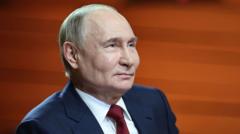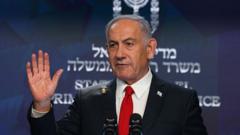With European nations and international bodies voicing serious concerns regarding Israel's military campaign in Gaza, the situation grows increasingly dire for the Jewish state, which faces potential sanctions and a diplomatic crisis. Former President Trump remains notably silent on the escalating tensions.**
Diplomatic Pressures Mount on Israel Amid Growing Global Outrage**

Diplomatic Pressures Mount on Israel Amid Growing Global Outrage**
Facing unprecedented condemnation from key allies and international actors, Israel's government struggles to respond to a barrage of criticism over its military actions in Gaza.**
---
As Israel grapples with increasing diplomatic pressures, recent developments reflect a significant shift in global sentiment towards the country’s military operations in Gaza. The liberal Israeli daily Ha'aretz succinctly captured the moment earlier this week, warning of a "diplomatic tsunami" as Europe vocally criticizes what it has labeled as Israel's "complete madness" in the conflict.
This week has seen an onslaught of international condemnation, notably following joint statements from Britain, France, and Canada, which criticized Israel's actions as "egregious." These nations have warned of potential "concrete actions" if Israel persists with its military offensive and refuses to ease humanitarian aid restrictions in Gaza – a territory now reportedly on the brink of mass starvation.
In the wake of these warnings, Britain took definitive action by suspending trade talks with Israel, as well as reviewing its framework for cooperation scheduled for 2023. This was accompanied by a new round of sanctions targeting Israeli settlers, including prominent figures who were previously portrayed in media narratives.
Israel’s ambassador to the UK, Tzipi Hotovely, was summoned to discuss the current situation, an act typically reserved for more contentious nations. Amidst these external pressures, European Union foreign policy chief Kaja Kallas indicated an overwhelming consensus among member states advocating for a review of the long-standing Association Agreement with Israel.
The humanitarian situation in Gaza has emerged as a focal point for global outrage, with allegations of extreme rhetoric from Israeli officials, including calls to "cleanse" the territory. UK Foreign Secretary David Lammy described such statements as "extremism" that deserved unequivocal condemnation.
The growing international concern is mirrored in the political landscape within the UK, which has witnessed heightened critiques directed at Prime Minister Sir Keir Starmer who, though a traditional Israel supporter, acknowledged the "utterly intolerable" suffering of innocent children in Gaza.
However, instead of engaging with these earnest calls for restraint and humanitarian considerations, Israeli Prime Minister Benjamin Netanyahu displayed indignation, accusing allied nations of supporting acts by Hamas. Israeli officials, including Foreign Minister Gideon Sa'ar, have gone so far as to suggest a connection between Israel's critics and acts of violence against its representatives abroad, following the tragic gunning down of two Israeli embassy workers in Washington.
Despite the chorus of disapproval emanating from Western allies and many within the Jewish community, one prominent figure remained notably silent throughout this turmoil: Donald Trump. While strategic forces within the U.S. government revealed frustrations regarding Israel's military campaign, the former president has avoided substantial commentary, heightening concerns about his potential influence during this crisis.
As diplomatic relations fray and the humanitarian situation in Gaza continues to deteriorate, Israel faces an increasingly isolated position, underscoring the shifting tides of international support and the urgent calls for both accountability and compassion.
As Israel grapples with increasing diplomatic pressures, recent developments reflect a significant shift in global sentiment towards the country’s military operations in Gaza. The liberal Israeli daily Ha'aretz succinctly captured the moment earlier this week, warning of a "diplomatic tsunami" as Europe vocally criticizes what it has labeled as Israel's "complete madness" in the conflict.
This week has seen an onslaught of international condemnation, notably following joint statements from Britain, France, and Canada, which criticized Israel's actions as "egregious." These nations have warned of potential "concrete actions" if Israel persists with its military offensive and refuses to ease humanitarian aid restrictions in Gaza – a territory now reportedly on the brink of mass starvation.
In the wake of these warnings, Britain took definitive action by suspending trade talks with Israel, as well as reviewing its framework for cooperation scheduled for 2023. This was accompanied by a new round of sanctions targeting Israeli settlers, including prominent figures who were previously portrayed in media narratives.
Israel’s ambassador to the UK, Tzipi Hotovely, was summoned to discuss the current situation, an act typically reserved for more contentious nations. Amidst these external pressures, European Union foreign policy chief Kaja Kallas indicated an overwhelming consensus among member states advocating for a review of the long-standing Association Agreement with Israel.
The humanitarian situation in Gaza has emerged as a focal point for global outrage, with allegations of extreme rhetoric from Israeli officials, including calls to "cleanse" the territory. UK Foreign Secretary David Lammy described such statements as "extremism" that deserved unequivocal condemnation.
The growing international concern is mirrored in the political landscape within the UK, which has witnessed heightened critiques directed at Prime Minister Sir Keir Starmer who, though a traditional Israel supporter, acknowledged the "utterly intolerable" suffering of innocent children in Gaza.
However, instead of engaging with these earnest calls for restraint and humanitarian considerations, Israeli Prime Minister Benjamin Netanyahu displayed indignation, accusing allied nations of supporting acts by Hamas. Israeli officials, including Foreign Minister Gideon Sa'ar, have gone so far as to suggest a connection between Israel's critics and acts of violence against its representatives abroad, following the tragic gunning down of two Israeli embassy workers in Washington.
Despite the chorus of disapproval emanating from Western allies and many within the Jewish community, one prominent figure remained notably silent throughout this turmoil: Donald Trump. While strategic forces within the U.S. government revealed frustrations regarding Israel's military campaign, the former president has avoided substantial commentary, heightening concerns about his potential influence during this crisis.
As diplomatic relations fray and the humanitarian situation in Gaza continues to deteriorate, Israel faces an increasingly isolated position, underscoring the shifting tides of international support and the urgent calls for both accountability and compassion.




















